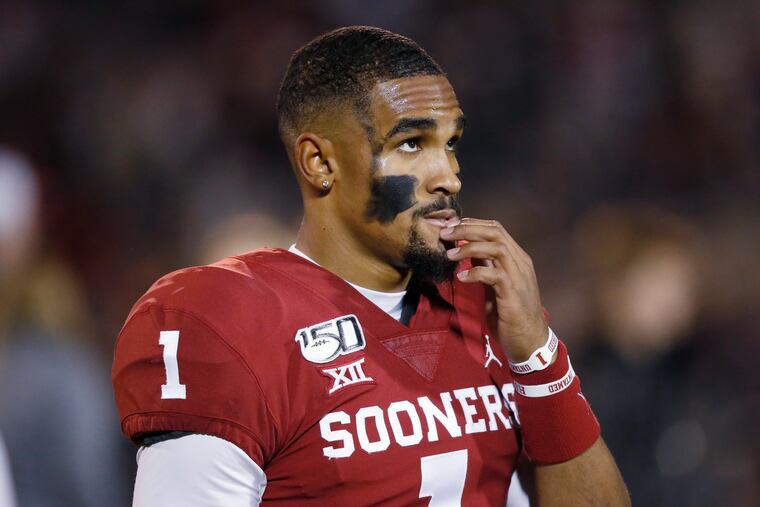Upon further review, Eagles’ drafting of Jalen Hurts was as silly as it seemed | David Murphy
There are only two scenarios in which it made sense for the Eagles to draft a quarterback in the second round. Neither is enough to outweigh the downsides.

Eagles fans: Put down the sippy cups and step away from the household cleaners. Jalen Hurts might not be your favorite second-round pick of all time, but at least he can’t disappoint you. If, as many fans seem to suspect, Hurts never plays a productive down in a midnight green uniform, that will simply put him in the same company as guys like Jaiquawn Jarrett, Trevor Laws, and Eric Rowe. If he spends his rookie season on the bench, he will get the chance to pick the brains of Sidney Jones and J.J. Arcega-Whiteside on the finer points of not playing.
Sure, there are plenty of reasons to quibble with the Eagles’ decision to spend a Top 55 pick on a player who, in an ideal world, will never take a snap. But, hey, drafting a productive player is a lot more difficult than not drafting a quarterback.
Not helping? Sorry, it’s the best I’ve got. On a night where the NFL commissioner spent time announcing picks from a leather easy chair in his basement next to a jar of M&M’s, the Eagles somehow managed to give us the strangest moment of the draft. In fact, strange doesn’t even begin to describe what they pulled. Spending a second-round pick on a quarterback less than a year after signing a 27-year-old franchise signal-caller to a record contract isn’t just unconventional. It is unprecedented.
The closest comparison to the current situation would probably be the 49ers’ drafting of Colin Kaepernick in the second round in 2011. At the time, San Francisco had a former No. 1 overall pick in Alex Smith who hadn’t yet turned 27. Really, though, age and pedigree are the only similarities. Smith was 19-31 in five seasons as a starter. Unlike the Eagles, the 49ers were at an unavoidable crossroads.
As for the Eagles, there are only two scenarios in which the drafting of Hurts is a sensible move. One, they think that Hurts can eventually contribute on game days at a position other than quarterback. Or, two, they have reason to think that Wentz’s career might be significantly shorter than that of a typical franchise quarterback.
Are there scenarios in which neither of these things is true and the pick turns out to be prescient? Sure. For at least the next four seasons, the Eagles will pay Hurts a fraction of the going rate for a veteran backup. That could mean an extra $5 million to $10 million of salary-cap space that they can invest in another position. Plus, if Hurts reaches his ceiling, the Eagles will have a better second-string quarterback than many teams have as their starter.
Even if they have little concern about the cumulative effect of the knee, back, and head injuries that Wentz has sustained during his first four years, they might feel that Wentz’s physical style of play leaves him with an elevated risk of missing time in any given season. If you could somehow guarantee that Hurts would become a top-flight NFL backup, and you were unenthused with the other options on the board, you could easily make the case that spending a No. 53 overall pick on him is good value.
Problem is, history offers no such guarantees. In fact, it indicates the opposite. From 2000 to 2019, there were 21 quarterbacks selected in the second round. The success stories are as follows: Derek Carr, Jimmy Garoppolo, Andy Dalton, Kaepernick, and Drew Brees. Beyond those five players, the quarterbacks with the most career starts are Chad Henne and Tarvaris Jackson. Even if you expand the sample to include every quarterback drafted after the first round, you’re still left with only 10 quarterbacks who made at least 50 career starts with a quarterback rating over 85.0.
On Friday night, general manager Howie Roseman said that he wants the Eagles to be known as a quarterback factory. But never before in the history of the draft has such a thing existed.
A much more common occurrence is the type of thing we saw the last time the Eagles drafted a quarterback in the second round with a guy already in place. Kevin Kolb was a burden for Donovan McNabb, and there’s a more than decent chance that Hurts becomes one for Wentz. Of the 36 quarterbacks selected in the first or second round from 2010 to 2018, all but three started at least 20% of their teams’ games in their first two seasons. All five of last year’s draftees started at least five games in their rookie season.
Occam’s razor (“Entities should not be multiplied without necessity") would suggest that the Eagles envision Hurts as something other than a traditional quarterback. While both Roseman and Doug Pederson insisted otherwise, Pederson acknowledged a potential role similar to that of Saints utility man Taysom Hill. There’s plenty of reason for them to downplay the significance of such a scenario, given Hurts’ stated belief that he is a future starting quarterback. Still, even if the Eagles do have other plans for him, that belief is not going away. For the foreseeable future, Wentz is going to share practice reps with a young, high-drafted quarterback who wants to be in his position.
What we have is a situation where even the best-case scenario could prove destructive. That’s a pretty good indication that this was an error in judgment.